中考英语全国通用版二轮复习专项一 完形填空(共27张PPT)
文档属性
| 名称 | 中考英语全国通用版二轮复习专项一 完形填空(共27张PPT) |  | |
| 格式 | pptx | ||
| 文件大小 | 702.3KB | ||
| 资源类型 | 教案 | ||
| 版本资源 | 通用版 | ||
| 科目 | 英语 | ||
| 更新时间 | 2023-06-22 21:38:01 | ||
图片预览

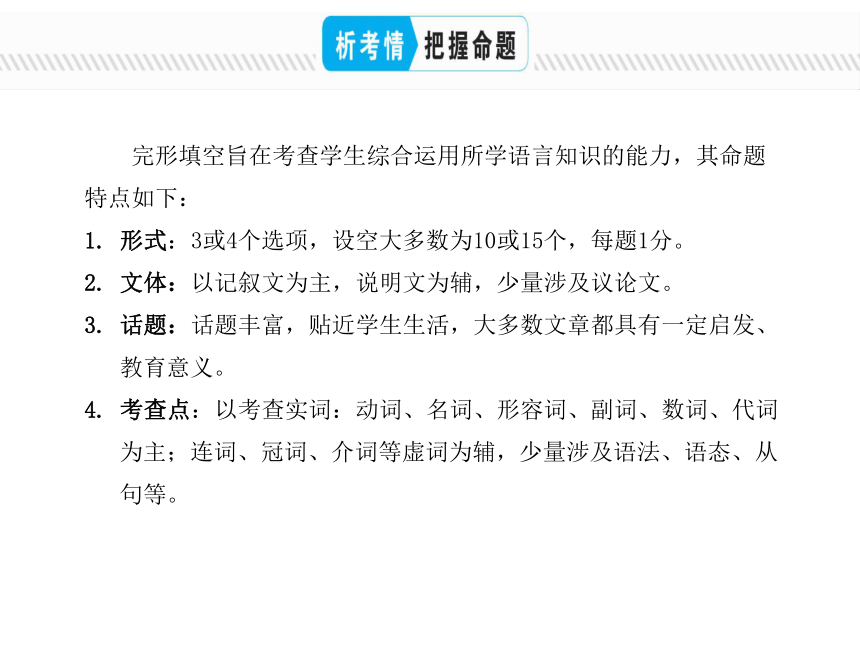
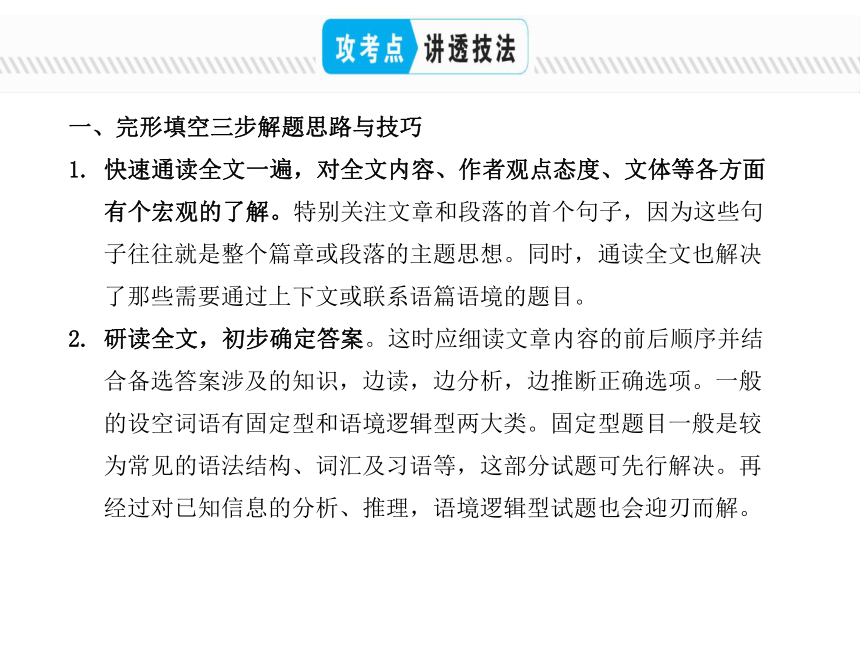

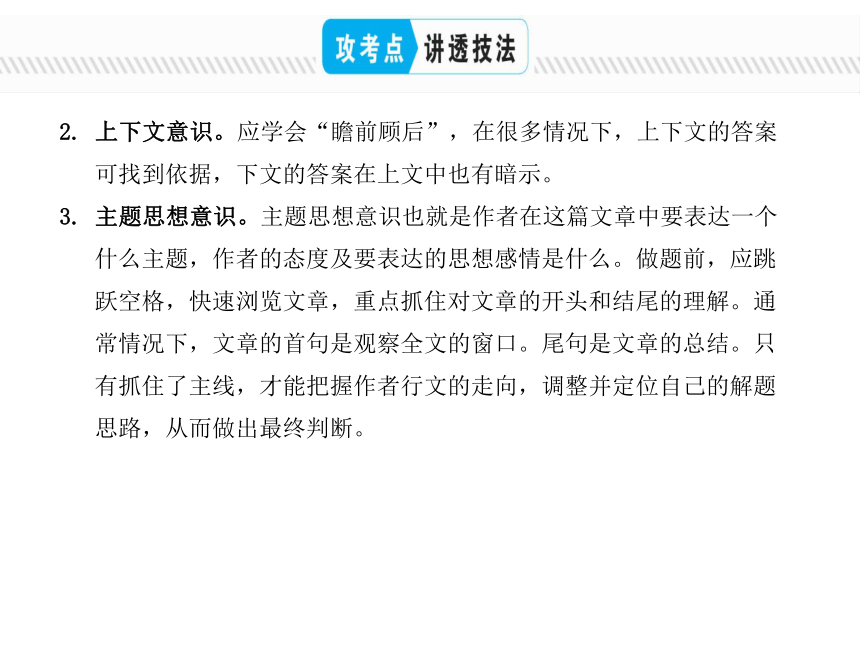
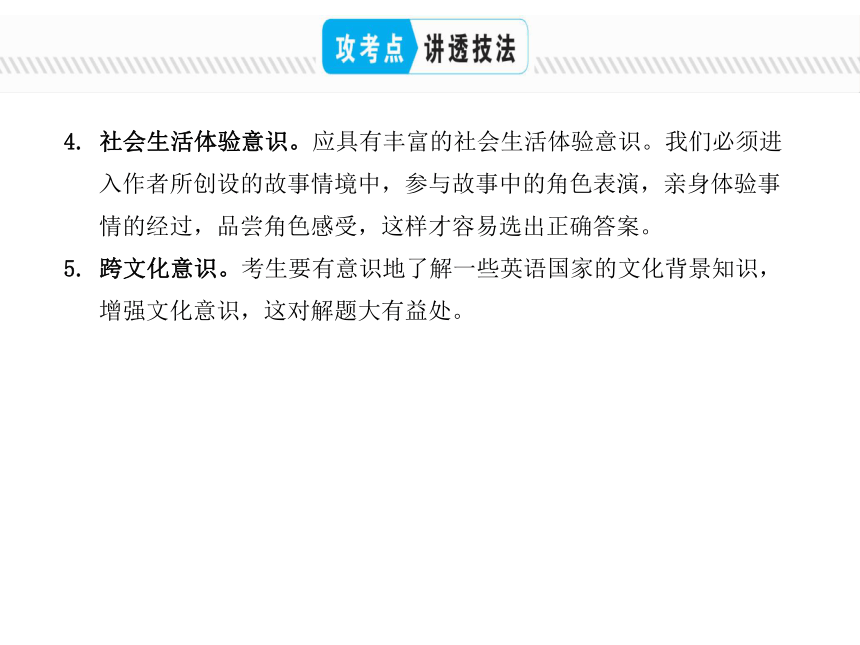

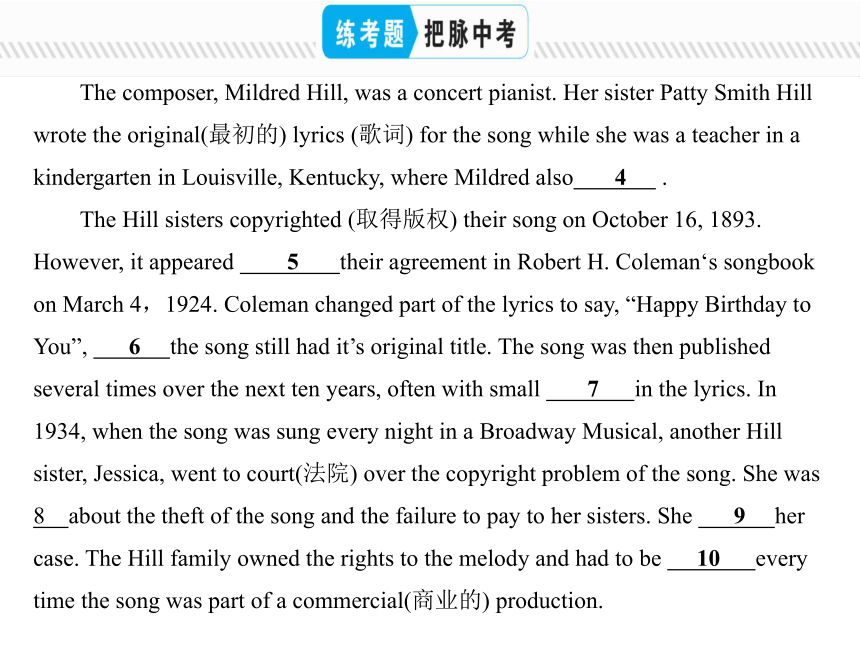
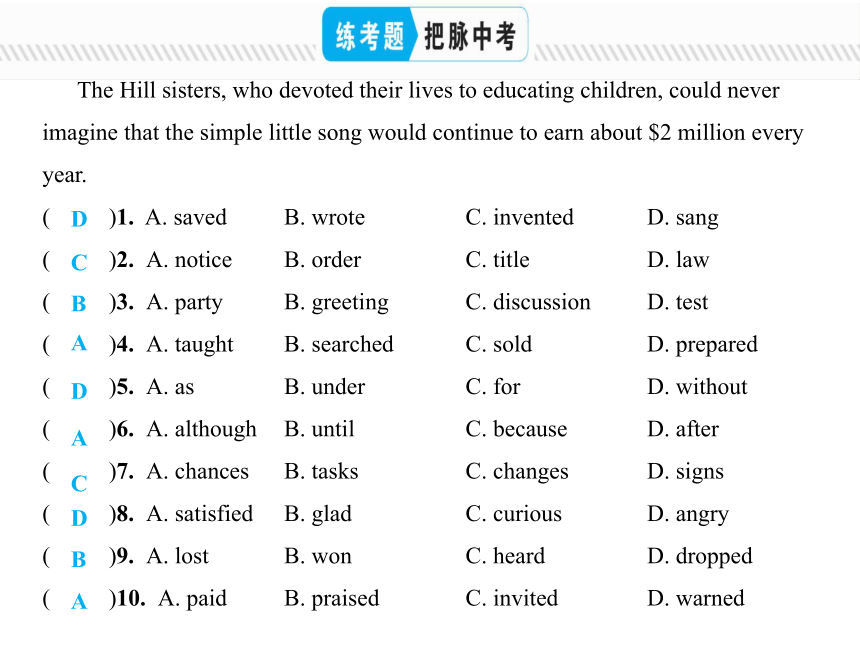
文档简介
(共27张PPT)
专项一 完形填空
析考情●把握命题
攻考点●讲透技巧
练考题●把脉中考
完形填空旨在考查学生综合运用所学语言知识的能力,其命题特点如下:
1. 形式:3或4个选项,设空大多数为10或15个,每题1分。
2. 文体:以记叙文为主,说明文为辅,少量涉及议论文。
3. 话题:话题丰富,贴近学生生活,大多数文章都具有一定启发、
教育意义。
4. 考查点:以考查实词:动词、名词、形容词、副词、数词、代词
为主;连词、冠词、介词等虚词为辅,少量涉及语法、语态、从
句等。
一、完形填空三步解题思路与技巧
1. 快速通读全文一遍,对全文内容、作者观点态度、文体等各方面
有个宏观的了解。特别关注文章和段落的首个句子,因为这些句
子往往就是整个篇章或段落的主题思想。同时,通读全文也解决
了那些需要通过上下文或联系语篇语境的题目。
2. 研读全文,初步确定答案。这时应细读文章内容的前后顺序并结
合备选答案涉及的知识,边读,边分析,边推断正确选项。一般
的设空词语有固定型和语境逻辑型两大类。固定型题目一般是较
为常见的语法结构、词汇及习语等,这部分试题可先行解决。再
经过对已知信息的分析、推理,语境逻辑型试题也会迎刃而解。
3. 复读全文,全面验证答案。填完空白后,重读全文,这时有可能
发现没有注意到的问题,也就能够根据对语篇的理解及内在的联
系,反复推敲,比较异同,从而选择一个更符合文章意义的答案。
同时检查填上答案后,文章意思是否通顺,语法语义是否准确。
二、把握五种意识巧解完形填空
1. 词汇、语法意识。完形填空的词汇以实词为主,词组和短语为辅,
另有少量的虚词。平时训练中应有意识地注意对大纲中规定的词和
短语的记忆,掌握它们的搭配规律。同时语法知识是指导我们做完
形填空的法宝。有些试题是根据语法知识、典型句型或句子与句子
之间的逻辑关系而设计的,要学会分析句子结构。
2. 上下文意识。应学会“瞻前顾后”,在很多情况下,上下文的答案
可找到依据,下文的答案在上文中也有暗示。
3. 主题思想意识。主题思想意识也就是作者在这篇文章中要表达一个
什么主题,作者的态度及要表达的思想感情是什么。做题前,应跳
跃空格,快速浏览文章,重点抓住对文章的开头和结尾的理解。通
常情况下,文章的首句是观察全文的窗口。尾句是文章的总结。只
有抓住了主线,才能把握作者行文的走向,调整并定位自己的解题
思路,从而做出最终判断。
4. 社会生活体验意识。应具有丰富的社会生活体验意识。我们必须进
入作者所创设的故事情境中,参与故事中的角色表演,亲身体验事
情的经过,品尝角色感受,这样才容易选出正确答案。
5. 跨文化意识。考生要有意识地了解一些英语国家的文化背景知识,
增强文化意识,这对解题大有益处。
(一) 2019·南京
Do you know that the “Happy Birthday to You” song is the first song sung in outer space Apollo IX astronauts 1 it on March 8, 1969. It is one of the most popular English songs of all time. Here's the story behind it.
The song was written by two sisters from Kentucky, Mildred and Patty Smith Hill. It was first published under the 2 of “Good Morning to All” in 1893. It was used as a classroom 3 . Teachers sang it each day to welcome their students to the classroom.
The composer, Mildred Hill, was a concert pianist. Her sister Patty Smith Hill wrote the original(最初的) lyrics (歌词) for the song while she was a teacher in a kindergarten in Louisville, Kentucky, where Mildred also 4 .
The Hill sisters copyrighted (取得版权) their song on October 16, 1893. However, it appeared 5 their agreement in Robert H. Coleman‘s songbook on March 4,1924. Coleman changed part of the lyrics to say, “Happy Birthday to You”, 6 the song still had it’s original title. The song was then published several times over the next ten years, often with small 7 in the lyrics. In 1934, when the song was sung every night in a Broadway Musical, another Hill sister, Jessica, went to court(法院) over the copyright problem of the song. She was 8 about the theft of the song and the failure to pay to her sisters. She 9 her case. The Hill family owned the rights to the melody and had to be 10 every time the song was part of a commercial(商业的) production.
The Hill sisters, who devoted their lives to educating children, could never
imagine that the simple little song would continue to earn about $2 million every year.
( )1. A. saved B. wrote C. invented D. sang
( )2. A. notice B. order C. title D. law
( )3. A. party B. greeting C. discussion D. test
( )4. A. taught B. searched C. sold D. prepared
( )5. A. as B. under C. for D. without
( )6. A. although B. until C. because D. after
( )7. A. chances B. tasks C. changes D. signs
( )8. A. satisfied B. glad C. curious D. angry
( )9. A. lost B. won C. heard D. dropped
( )10. A. paid B. praised C. invited D. warned
D
C
B
A
D
A
C
D
B
A
(二)2019·青岛
A gift is necessary when one is invited to visit friends in China. After greetings, the gift should be passed immediately to the host. Remember that usually Chinese people will not open the gift in front of the person who gives
1 To show the respect, it may be 2 to explain what the gift is. Bringing some nutrients and tonics (营养品、补品) to the elders in the family is a good idea. You can 3 prepare some small gifts for the spouse (配偶) or kids of the host. The host usually makes full 4 by carefully tidying up the house and 5 a lot of delicious dishes. 6 the meal is well prepared, the host may say to the guest politely, “My preparation is not enough, please excuse me for my poor treat.” As a guest, you should make the host believe that there is plenty to eat by praising the food.
While eating, the elders will use chopsticks to 7 food for guests as a tradition and ask them to eat 8 . As a guest, you should accept their goodwill readily. But nowadays, the younger people do the traditional way less.
After dinner, tea and fruit are usually served. When the guests are to leave, the host may still politely ask them to stay. They don't have to take it 9 and they can try to find a good time to leave. This doesn't mean that leaving early is always a good idea as the host may feel that the guests are not satisfied with the treat. Finding the right time to leave 10 the situation.
( )1. A. it B. them C. that
( )2. A. necessary B. careful C. comfortable
( )3. A. too B. also C. either
( )4. A. plans B. decisions C. preparations
( )5. A. enjoying B. cooking C. washing
( )6. A. But B. Although C. Because
( )7. A. cut up B. eat up C. pick up
( )8. A. more B. less C. many
( )9. A. completely B. seriously C. probably
( )10. A. works out B. sticks to C. depends on
A
A
B
C
B
B
C
A
B
C
(三)2019·兰州
Last year, we took a trip to New York City. When we arrived at our 1 , it was around 2 a.m. My son, Joseph, looked out at the lights of Times Square and said he wanted to go 2 I told him it was too 3 to go out, but he kept looking out of the window and said, “Just for two minutes.”
My wife and I just looked at each other, smiled and said, “Two minutes.” We got dressed and walked to the center of Times Square. 4 we got there, my son pointed at the lights and said, “Dad, 5 !” And then he started to fall asleep. So we had to go back to the hotel.
It took us 20 minutes to 6 for the 20 seconds we spent outside, but it made our son 7 and that meant a lot to us. That night, I learned a lesson about happiness. We sometimes have chances to 8 happy moments in our lives, but we often find 9 to do something else.
Because of my son, I learned that I am the biggest enemy to my own happiness. 10 happiness is a door that is always open, we are the ones who have to decide if we are going to walk through the door.
( )1. A. restaurant B. bank C. supermarket D. hotel
( )2. A. inside B. outside C. back D. home
( )3. A. hot B. early C. late D. cold
( )4. A. If B. Unless C. Because D. When
( )5. A. listen B. touch C. look D. smile
( )6. A. make rules B. get ready C. do sports D. have dinner
( )7. A. sad B. happy C. bored D. patient
( )8. A. create B. forget C. waste D. avoid
( )9. A. a place B. a book C. an excuse D. an order
( )10. A. Because B. Although C. Unless D. As soon as
B
C
D
C
B
B
C
A
A
D
(四)2019·武汉
Four years ago, Joel Kline gave up his job as a magazine editor to become a freelance copywriter for advertisements, but now he had money trouble. He says that he wishes he'd never 1 to set up his own business.
“I am now in such a bad situation,”says Joel, “I hope I am 2 working as an editor . You see, I was 3 with my job, and I used to get really angry at my boss and the way he used to 4 me around all the time. I talked to a few friends and they said that they could give me 5 , so I told my boss I was leaving. At first, everything was 6 :I had so much work that I had to take on an assistant(助理),my best friend at work, Don, just to be 7 to finish things on time.
And soon we 8 large amounts of money. Don and I had a really great lifestyle, and when the work was finished, we used to take good 9 in places like Cancum and the Bahams,just to get relaxed.
At first,we were busy having fun, and charged(支付) everything to my credit cards instead, but then I began to 10 how much in debt(负债) I was. At last, I had to 11 Don off. I then had to sell all my office equipment(设备).Now I could do almost nothing even if people 12 me. Things got so bad that I even asked my old boss if I could do some work for the 13 , but he said that I'd been so 14 to him when I left that he would never employe(雇佣)me again. I've had to 15 my business now and I don't know what I'm going to do for money. It just goes to show, if you set up your own business, you shouldn't spend money you don't have.”
( )1. A. pretended B. learned C. failed D. decided
( )2. A. specially B. still C. also D. certainly
( )3. A. pleased B. strict C. bored D. patient
( )4. A. show B. order C. serve D. lead
( )5. A. time B. money C. food D. work
( )6. A. perfect B. wrong C. hard D. fun
( )7. A. afraid B. ready C. able D. about
( )8. A. lost B. borrowed C. donated D. made
( )9. A. vacations B. pictures C. courses D. chances
( )10. A. imagine B. remember C. wonder D. realize
( )11. A. lay B. see C. take D. put
C
B
D
A
C
D
A
D
A
D
B
( )12. A. paid B. helped C. forgot D. asked
( )13. A. advertisement B. magazine C. equipment D. lifestyle
( )14. A. shy B. rude C. lazy D. straight
( )15. A. close down B. pick up C. turn down D. set up
(五) 2019·长沙
Thanksgiving was just around the corner. The menu(菜谱) had been set. The shopping list was made . 1 seemed perfect. I could taste turkey and mashed potatoes(火鸡和土豆泥). Pictures of different pies, fruit and vegetables came into my mind. I couldn't 2 !
The day before Thanksgiving my dad called a family meeting. He said we needed to practice being 3 .“We are going to 4 at a homeless
D
B
B
A
shelter(收容所) on Thanksgiving Day.” I couldn't believe this was happening. So we wouldn't cook our own Thanksgiving dinner The holiday wouldn't be the same. I thought the day would be ruined(糟蹋).
The next morning, we got up 5 I followed my father to the shelter with my sleepy eyes. I had no great expectations and felt 6 all the way. As soon as we arrived, we got to work. There was so much to be done. But all I could think about was the dinner I couldn't enjoy.
However, those thoughts soon 7 .Over the next few hours, I watched hundreds of people come through the shelter. For some, this was the only hot meal they would eat that week. For others, it was the first time to eat a
Thanksgiving meal. The shelter was filled with 8 .
Through this experience, I learned that Thanksgiving is a time to think about your blessings(祝福)and look for ways to bless others. When I gave up what I had
wanted, I discovered how much I have. It is much better to 9 . than to receive. In the end, that Thanksgiving became an 10 experience.
( )1. A . Something B.Everything C.Nothing
( )2. A . wait B.care C.understand
( )3. A . creative B.nervous C.thankful
( )4. A . rush out B.help out C.check out
( )5. A . early B.late C.suddenly
( )6. A . excited B.good C.down
( )7. A .appeared B.disappeared C.rose
( )8. A . stress B.joy C.fear
( )9. A . give B.take C.waste
( )10. A . uncomfortable B . unreasonable C .unforgettable
B
A
C
B
A
C
B
B
A
C
(六)2019·陕西
John was a manager in a factory. He enjoyed running for exercise around the park when he was free.
One Sunday afternoon, after running as usual, John 1 to go home and have a rest. Just then, he noticed an old woman standing by the road. 2 old woman looked around worriedly. John went over and asked what 3 for her. After a short talk,John came to know that she forgot her way home and got lost. Besides, she was very tired and hungry. John called the old woman's son and then took her to the 4 restaurant.
In the restaurant, John ordered food and drink for the old woman 5 .While eating, sometimes she carelessly sprinkled(撒) food and drink on the table and on her coat. Other customers felt disgusted(厌恶的) at this sight.
6 John didn't care about this. He stood up and cleaned the table from time to time 7 silence.
It took the old woman some time 8 eating. After that, John paid the bill and they were ready to leave when the old woman's son arrived. He held John's hands and said, “Thanks to your help, my mother 9 well!” “You're welcome. She makes me remember my mom who died years ago. I did what a son should do,”said John. All the 10 around showed respect(尊敬) to John. They were touched by his kindness.
( )1. A.decided B.has decided C.decides D.will decide
( )2. A.A B.An C.The D./
( )3. A.can he do B.he can do C.could he do D.he could do
( )4. A.nearest B.nearer C.farthest D.farther
( )5. A.polite B.politely C.angry D.angrily
( )6. A.And B.But C.Or D.So
( )7. A.on B.for C.in D.with
( )8. A.to finish B.finish C.finishes D.finished
( )9. A.treats B.is treating C.was treated D.will be treated
( )10. A.woman B.women C.customer D.customers
C
D
A
B
B
C
A
C
D
A
(七)2019·成都
A
As a police artist, Joe Brown draws pictures of suspects (嫌疑犯) when people tell him about the 1 of each suspect. Then, the police put the pictures in newspapers and on television to help 2 the suspects.
His job is interesting but not 3 , because different people describe the same person differently and sometimes many people don't have good 4 , especially the old. “The suspect is of medium height and young. He has long straight brown hair and big eyes,” an old woman says. Another woman says, “He's tall and thin with blonde hair. He's about thirty years old.” In the end, the real 5 is a short heavy man and he has short brown hair.
( )1. A. act B. personality C. appearance
( )2. A. remember B. find C. describe
( )3. A. easy B. exciting C. useful
( )4. A. expressions B. methods C. memories
( )5. A. artist B. criminal C. policeman
B
One day in class, the teacher held up an apple. She stood on the platform (讲台) and said, “Please 1 it in the air, and…”
One student 2 his hand and said, “I can smell it. It is the smell of an apple.”
The teacher stepped 3 the platform, passed by each of the students and said, “Smell 4 to see if the smell of the apple is still in the air.”
Half of the students put up their hands to show that they could smell it.
C
B
A
C
B
The teacher returned to the 5 of the classroom and asked again who else could smell the apple. The rest raised their hands except one boy. The teacher came to the boy and asked, “You really can't smell the apple?”
The boy answered, “No, I can't smell it. I don't think it's a 6 apple.”
The teacher 7 at the boy and said to the class, “He's right! It's not
8 to get the apple smell from this apple.”
All of the other students had been tricked. Some may have thought that perhaps the apple didn't have the apple smell, 9 they didn't dare to speak up. They just 10 the first student blindly and went along with him.
( )1. A. watch B. feel C. smell
( )2. A. shook B. raised C. showed
( )3. A. on B. off C. towards
( )4. A. later B. once C. again
( )5. A. front B. middle C. back
( )6. A. real B. tasty C. nice
( )7. A. laughed B. smiled C. shouted
( )8. A. surprising B. possible C. common
( )9. A. and B. so C. but
( )10. A. followed B. admired C. preferred
C
B
B
C
A
A
B
B
C
A
专项一 完形填空
析考情●把握命题
攻考点●讲透技巧
练考题●把脉中考
完形填空旨在考查学生综合运用所学语言知识的能力,其命题特点如下:
1. 形式:3或4个选项,设空大多数为10或15个,每题1分。
2. 文体:以记叙文为主,说明文为辅,少量涉及议论文。
3. 话题:话题丰富,贴近学生生活,大多数文章都具有一定启发、
教育意义。
4. 考查点:以考查实词:动词、名词、形容词、副词、数词、代词
为主;连词、冠词、介词等虚词为辅,少量涉及语法、语态、从
句等。
一、完形填空三步解题思路与技巧
1. 快速通读全文一遍,对全文内容、作者观点态度、文体等各方面
有个宏观的了解。特别关注文章和段落的首个句子,因为这些句
子往往就是整个篇章或段落的主题思想。同时,通读全文也解决
了那些需要通过上下文或联系语篇语境的题目。
2. 研读全文,初步确定答案。这时应细读文章内容的前后顺序并结
合备选答案涉及的知识,边读,边分析,边推断正确选项。一般
的设空词语有固定型和语境逻辑型两大类。固定型题目一般是较
为常见的语法结构、词汇及习语等,这部分试题可先行解决。再
经过对已知信息的分析、推理,语境逻辑型试题也会迎刃而解。
3. 复读全文,全面验证答案。填完空白后,重读全文,这时有可能
发现没有注意到的问题,也就能够根据对语篇的理解及内在的联
系,反复推敲,比较异同,从而选择一个更符合文章意义的答案。
同时检查填上答案后,文章意思是否通顺,语法语义是否准确。
二、把握五种意识巧解完形填空
1. 词汇、语法意识。完形填空的词汇以实词为主,词组和短语为辅,
另有少量的虚词。平时训练中应有意识地注意对大纲中规定的词和
短语的记忆,掌握它们的搭配规律。同时语法知识是指导我们做完
形填空的法宝。有些试题是根据语法知识、典型句型或句子与句子
之间的逻辑关系而设计的,要学会分析句子结构。
2. 上下文意识。应学会“瞻前顾后”,在很多情况下,上下文的答案
可找到依据,下文的答案在上文中也有暗示。
3. 主题思想意识。主题思想意识也就是作者在这篇文章中要表达一个
什么主题,作者的态度及要表达的思想感情是什么。做题前,应跳
跃空格,快速浏览文章,重点抓住对文章的开头和结尾的理解。通
常情况下,文章的首句是观察全文的窗口。尾句是文章的总结。只
有抓住了主线,才能把握作者行文的走向,调整并定位自己的解题
思路,从而做出最终判断。
4. 社会生活体验意识。应具有丰富的社会生活体验意识。我们必须进
入作者所创设的故事情境中,参与故事中的角色表演,亲身体验事
情的经过,品尝角色感受,这样才容易选出正确答案。
5. 跨文化意识。考生要有意识地了解一些英语国家的文化背景知识,
增强文化意识,这对解题大有益处。
(一) 2019·南京
Do you know that the “Happy Birthday to You” song is the first song sung in outer space Apollo IX astronauts 1 it on March 8, 1969. It is one of the most popular English songs of all time. Here's the story behind it.
The song was written by two sisters from Kentucky, Mildred and Patty Smith Hill. It was first published under the 2 of “Good Morning to All” in 1893. It was used as a classroom 3 . Teachers sang it each day to welcome their students to the classroom.
The composer, Mildred Hill, was a concert pianist. Her sister Patty Smith Hill wrote the original(最初的) lyrics (歌词) for the song while she was a teacher in a kindergarten in Louisville, Kentucky, where Mildred also 4 .
The Hill sisters copyrighted (取得版权) their song on October 16, 1893. However, it appeared 5 their agreement in Robert H. Coleman‘s songbook on March 4,1924. Coleman changed part of the lyrics to say, “Happy Birthday to You”, 6 the song still had it’s original title. The song was then published several times over the next ten years, often with small 7 in the lyrics. In 1934, when the song was sung every night in a Broadway Musical, another Hill sister, Jessica, went to court(法院) over the copyright problem of the song. She was 8 about the theft of the song and the failure to pay to her sisters. She 9 her case. The Hill family owned the rights to the melody and had to be 10 every time the song was part of a commercial(商业的) production.
The Hill sisters, who devoted their lives to educating children, could never
imagine that the simple little song would continue to earn about $2 million every year.
( )1. A. saved B. wrote C. invented D. sang
( )2. A. notice B. order C. title D. law
( )3. A. party B. greeting C. discussion D. test
( )4. A. taught B. searched C. sold D. prepared
( )5. A. as B. under C. for D. without
( )6. A. although B. until C. because D. after
( )7. A. chances B. tasks C. changes D. signs
( )8. A. satisfied B. glad C. curious D. angry
( )9. A. lost B. won C. heard D. dropped
( )10. A. paid B. praised C. invited D. warned
D
C
B
A
D
A
C
D
B
A
(二)2019·青岛
A gift is necessary when one is invited to visit friends in China. After greetings, the gift should be passed immediately to the host. Remember that usually Chinese people will not open the gift in front of the person who gives
1 To show the respect, it may be 2 to explain what the gift is. Bringing some nutrients and tonics (营养品、补品) to the elders in the family is a good idea. You can 3 prepare some small gifts for the spouse (配偶) or kids of the host. The host usually makes full 4 by carefully tidying up the house and 5 a lot of delicious dishes. 6 the meal is well prepared, the host may say to the guest politely, “My preparation is not enough, please excuse me for my poor treat.” As a guest, you should make the host believe that there is plenty to eat by praising the food.
While eating, the elders will use chopsticks to 7 food for guests as a tradition and ask them to eat 8 . As a guest, you should accept their goodwill readily. But nowadays, the younger people do the traditional way less.
After dinner, tea and fruit are usually served. When the guests are to leave, the host may still politely ask them to stay. They don't have to take it 9 and they can try to find a good time to leave. This doesn't mean that leaving early is always a good idea as the host may feel that the guests are not satisfied with the treat. Finding the right time to leave 10 the situation.
( )1. A. it B. them C. that
( )2. A. necessary B. careful C. comfortable
( )3. A. too B. also C. either
( )4. A. plans B. decisions C. preparations
( )5. A. enjoying B. cooking C. washing
( )6. A. But B. Although C. Because
( )7. A. cut up B. eat up C. pick up
( )8. A. more B. less C. many
( )9. A. completely B. seriously C. probably
( )10. A. works out B. sticks to C. depends on
A
A
B
C
B
B
C
A
B
C
(三)2019·兰州
Last year, we took a trip to New York City. When we arrived at our 1 , it was around 2 a.m. My son, Joseph, looked out at the lights of Times Square and said he wanted to go 2 I told him it was too 3 to go out, but he kept looking out of the window and said, “Just for two minutes.”
My wife and I just looked at each other, smiled and said, “Two minutes.” We got dressed and walked to the center of Times Square. 4 we got there, my son pointed at the lights and said, “Dad, 5 !” And then he started to fall asleep. So we had to go back to the hotel.
It took us 20 minutes to 6 for the 20 seconds we spent outside, but it made our son 7 and that meant a lot to us. That night, I learned a lesson about happiness. We sometimes have chances to 8 happy moments in our lives, but we often find 9 to do something else.
Because of my son, I learned that I am the biggest enemy to my own happiness. 10 happiness is a door that is always open, we are the ones who have to decide if we are going to walk through the door.
( )1. A. restaurant B. bank C. supermarket D. hotel
( )2. A. inside B. outside C. back D. home
( )3. A. hot B. early C. late D. cold
( )4. A. If B. Unless C. Because D. When
( )5. A. listen B. touch C. look D. smile
( )6. A. make rules B. get ready C. do sports D. have dinner
( )7. A. sad B. happy C. bored D. patient
( )8. A. create B. forget C. waste D. avoid
( )9. A. a place B. a book C. an excuse D. an order
( )10. A. Because B. Although C. Unless D. As soon as
B
C
D
C
B
B
C
A
A
D
(四)2019·武汉
Four years ago, Joel Kline gave up his job as a magazine editor to become a freelance copywriter for advertisements, but now he had money trouble. He says that he wishes he'd never 1 to set up his own business.
“I am now in such a bad situation,”says Joel, “I hope I am 2 working as an editor . You see, I was 3 with my job, and I used to get really angry at my boss and the way he used to 4 me around all the time. I talked to a few friends and they said that they could give me 5 , so I told my boss I was leaving. At first, everything was 6 :I had so much work that I had to take on an assistant(助理),my best friend at work, Don, just to be 7 to finish things on time.
And soon we 8 large amounts of money. Don and I had a really great lifestyle, and when the work was finished, we used to take good 9 in places like Cancum and the Bahams,just to get relaxed.
At first,we were busy having fun, and charged(支付) everything to my credit cards instead, but then I began to 10 how much in debt(负债) I was. At last, I had to 11 Don off. I then had to sell all my office equipment(设备).Now I could do almost nothing even if people 12 me. Things got so bad that I even asked my old boss if I could do some work for the 13 , but he said that I'd been so 14 to him when I left that he would never employe(雇佣)me again. I've had to 15 my business now and I don't know what I'm going to do for money. It just goes to show, if you set up your own business, you shouldn't spend money you don't have.”
( )1. A. pretended B. learned C. failed D. decided
( )2. A. specially B. still C. also D. certainly
( )3. A. pleased B. strict C. bored D. patient
( )4. A. show B. order C. serve D. lead
( )5. A. time B. money C. food D. work
( )6. A. perfect B. wrong C. hard D. fun
( )7. A. afraid B. ready C. able D. about
( )8. A. lost B. borrowed C. donated D. made
( )9. A. vacations B. pictures C. courses D. chances
( )10. A. imagine B. remember C. wonder D. realize
( )11. A. lay B. see C. take D. put
C
B
D
A
C
D
A
D
A
D
B
( )12. A. paid B. helped C. forgot D. asked
( )13. A. advertisement B. magazine C. equipment D. lifestyle
( )14. A. shy B. rude C. lazy D. straight
( )15. A. close down B. pick up C. turn down D. set up
(五) 2019·长沙
Thanksgiving was just around the corner. The menu(菜谱) had been set. The shopping list was made . 1 seemed perfect. I could taste turkey and mashed potatoes(火鸡和土豆泥). Pictures of different pies, fruit and vegetables came into my mind. I couldn't 2 !
The day before Thanksgiving my dad called a family meeting. He said we needed to practice being 3 .“We are going to 4 at a homeless
D
B
B
A
shelter(收容所) on Thanksgiving Day.” I couldn't believe this was happening. So we wouldn't cook our own Thanksgiving dinner The holiday wouldn't be the same. I thought the day would be ruined(糟蹋).
The next morning, we got up 5 I followed my father to the shelter with my sleepy eyes. I had no great expectations and felt 6 all the way. As soon as we arrived, we got to work. There was so much to be done. But all I could think about was the dinner I couldn't enjoy.
However, those thoughts soon 7 .Over the next few hours, I watched hundreds of people come through the shelter. For some, this was the only hot meal they would eat that week. For others, it was the first time to eat a
Thanksgiving meal. The shelter was filled with 8 .
Through this experience, I learned that Thanksgiving is a time to think about your blessings(祝福)and look for ways to bless others. When I gave up what I had
wanted, I discovered how much I have. It is much better to 9 . than to receive. In the end, that Thanksgiving became an 10 experience.
( )1. A . Something B.Everything C.Nothing
( )2. A . wait B.care C.understand
( )3. A . creative B.nervous C.thankful
( )4. A . rush out B.help out C.check out
( )5. A . early B.late C.suddenly
( )6. A . excited B.good C.down
( )7. A .appeared B.disappeared C.rose
( )8. A . stress B.joy C.fear
( )9. A . give B.take C.waste
( )10. A . uncomfortable B . unreasonable C .unforgettable
B
A
C
B
A
C
B
B
A
C
(六)2019·陕西
John was a manager in a factory. He enjoyed running for exercise around the park when he was free.
One Sunday afternoon, after running as usual, John 1 to go home and have a rest. Just then, he noticed an old woman standing by the road. 2 old woman looked around worriedly. John went over and asked what 3 for her. After a short talk,John came to know that she forgot her way home and got lost. Besides, she was very tired and hungry. John called the old woman's son and then took her to the 4 restaurant.
In the restaurant, John ordered food and drink for the old woman 5 .While eating, sometimes she carelessly sprinkled(撒) food and drink on the table and on her coat. Other customers felt disgusted(厌恶的) at this sight.
6 John didn't care about this. He stood up and cleaned the table from time to time 7 silence.
It took the old woman some time 8 eating. After that, John paid the bill and they were ready to leave when the old woman's son arrived. He held John's hands and said, “Thanks to your help, my mother 9 well!” “You're welcome. She makes me remember my mom who died years ago. I did what a son should do,”said John. All the 10 around showed respect(尊敬) to John. They were touched by his kindness.
( )1. A.decided B.has decided C.decides D.will decide
( )2. A.A B.An C.The D./
( )3. A.can he do B.he can do C.could he do D.he could do
( )4. A.nearest B.nearer C.farthest D.farther
( )5. A.polite B.politely C.angry D.angrily
( )6. A.And B.But C.Or D.So
( )7. A.on B.for C.in D.with
( )8. A.to finish B.finish C.finishes D.finished
( )9. A.treats B.is treating C.was treated D.will be treated
( )10. A.woman B.women C.customer D.customers
C
D
A
B
B
C
A
C
D
A
(七)2019·成都
A
As a police artist, Joe Brown draws pictures of suspects (嫌疑犯) when people tell him about the 1 of each suspect. Then, the police put the pictures in newspapers and on television to help 2 the suspects.
His job is interesting but not 3 , because different people describe the same person differently and sometimes many people don't have good 4 , especially the old. “The suspect is of medium height and young. He has long straight brown hair and big eyes,” an old woman says. Another woman says, “He's tall and thin with blonde hair. He's about thirty years old.” In the end, the real 5 is a short heavy man and he has short brown hair.
( )1. A. act B. personality C. appearance
( )2. A. remember B. find C. describe
( )3. A. easy B. exciting C. useful
( )4. A. expressions B. methods C. memories
( )5. A. artist B. criminal C. policeman
B
One day in class, the teacher held up an apple. She stood on the platform (讲台) and said, “Please 1 it in the air, and…”
One student 2 his hand and said, “I can smell it. It is the smell of an apple.”
The teacher stepped 3 the platform, passed by each of the students and said, “Smell 4 to see if the smell of the apple is still in the air.”
Half of the students put up their hands to show that they could smell it.
C
B
A
C
B
The teacher returned to the 5 of the classroom and asked again who else could smell the apple. The rest raised their hands except one boy. The teacher came to the boy and asked, “You really can't smell the apple?”
The boy answered, “No, I can't smell it. I don't think it's a 6 apple.”
The teacher 7 at the boy and said to the class, “He's right! It's not
8 to get the apple smell from this apple.”
All of the other students had been tricked. Some may have thought that perhaps the apple didn't have the apple smell, 9 they didn't dare to speak up. They just 10 the first student blindly and went along with him.
( )1. A. watch B. feel C. smell
( )2. A. shook B. raised C. showed
( )3. A. on B. off C. towards
( )4. A. later B. once C. again
( )5. A. front B. middle C. back
( )6. A. real B. tasty C. nice
( )7. A. laughed B. smiled C. shouted
( )8. A. surprising B. possible C. common
( )9. A. and B. so C. but
( )10. A. followed B. admired C. preferred
C
B
B
C
A
A
B
B
C
A
同课章节目录
- 词法
- 名词
- 动词和动词短语
- 动词语态
- 动词时态
- 助动词和情态动词
- 非谓语动词
- 冠词
- 代词
- 数词和量词
- 形容词副词及其比较等级
- 介词和介词短语
- 连词和感叹词
- 构词法
- 相似、相近词比较
- 句法
- 陈述句
- 一般疑问句和否定疑问句
- 特殊疑问句及选择疑问句
- 反意疑问句
- 存在句(There be句型)
- 宾语从句
- 定语从句
- 状语从句
- 主谓一致问题
- 简单句
- 并列句
- 复合句
- 主谓一致
- 主、表语从句
- 名词性从句
- 直接引语和间接引语
- 虚拟语气
- 感叹句
- 强调句
- 倒装句
- 祈使句
- 句子的成分
- 句子的分类
- 题型专区
- 单项选择部分
- 易错题
- 完形填空
- 阅读理解
- 词汇练习
- 听说训练
- 句型转换
- 补全对话
- 短文改错
- 翻译
- 书面表达
- 任务型阅读
- 语法填空
- 其他资料
